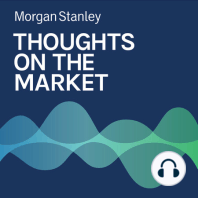3 min listen

Economics Roundtable: Updating our 2024 Outlook
Economics Roundtable: Updating our 2024 Outlook
ratings:
Length:
12 minutes
Released:
Mar 14, 2024
Format:
Podcast episode
Description
Morgan Stanley’s chief economists have their quarterly roundtable discussion, focusing on the state of inflation across global regions, the possible effect of the US election on the economy and more.----- Transcript -----Seth Carpenter: Welcome to Thoughts On the Market. I'm Seth Carpenter, Morgan Stanley's Global Chief Economist. On this episode, on this special episode of the podcast, we'll hold our second roundtable discussion covering Morgan Stanley's global economic outlook as we look into the second quarter of 2024.It's Thursday, March the 14th at 10 am in New York.Jens Eisenschmidt: And it's 2 pm in London.Chetan Ahya: And 10pm in Hong Kong.Seth Carpenter: Excellent. So, things around the world have changed significantly since our roundtable last quarter. US growth is notably stronger with few signs of a substantial slowdown. Inflation is falling, but giving some hints that things could stay -- maybe -- hotter for longer.In Europe, things are evolving mostly as anticipated, but energy prices are much lower, and some data suggest hope for a recovery. Meanwhile, in China, debt deflation risks are becoming a reality. And the last policy communication shows no sign of reflation. And finally, Japan continues to confirm the shift in equilibrium, and we are expecting the policy rate change imminently.So, let's dig into these developments. I am joined by the leaders of the economics team in key regions. Ellen Zentner is our Chief US Economist, and she's here with me in New York. Chetan Ahya is our Chief Asia Economist, and Jens Eisenschmidt is our Chief Europe Economist.Ellen, I'm going to start with you and the US. Have the stronger data fundamentally changed your view on the US economy or the Fed?Ellen Zentner: So, coming off of 2023, growth was just stronger than expected. And so, carrying that into 2024, we have revised upward our GDP forecast from 1.6 per cent Q4 over Q4 to 1.8 per cent. So already we've got stronger growth this year. We have not changed our inflation forecast though; because this could be another year of stronger data coming from supply side normalization, and in particular the labor market -- where it's come amid higher productivity and decelerating inflation. So, I think we're in store for another year like that. And I would say if I add risks, it would be risk to the upside on growth.Seth Carpenter: Okay, that makes sense. But if there's risk to the upside on growth -- surely there's some risk that the extra strength in growth, or even some of the slightly stronger inflation that we've seen, that all of that could persist; and the Fed could delay their first cut beyond the June meeting, which is what you've got penciled in for the first cut. So how do you think about the risks to the timing for the Fed?Ellen Zentner: So, I think you've got a strong backdrop for growth. You've got relatively easy financial conditions. And Fed policymakers have noted that that could pose upside risks to the economy and to inflation. And so, they're very carefully parsing every data point that comes in. Chair Powell said they need a bit more confidence on inflation coming down. And so that means that the year over year rate on core PCE -- their preferred measure of inflation -- needs to continue to take down.I think that the risk is more how long they stay on hold -- than if the next move is a hike, which investors have been very focused on. Do we get to that point? And so certainly if we don't see the next couple of months and further improvement, then I think it just does lead for a longer hold time for the Fed.Seth Carpenter: All right. A risk of a longer hold time. Chetan, how do you think about that risk?Chetan Ahya: That risk is important to consider. We recently published on the idea that Asian central banks will have to wait for the Fed. Even though inflation across Asia is settling back into target ranges, central banks appear to be concerned that real rate differentials versus US are negative and still widening,
Released:
Mar 14, 2024
Format:
Podcast episode
Titles in the series (100)
Mike Wilson: Are U.S. Economic Indicators Flashing Yellow? by Thoughts on the Market